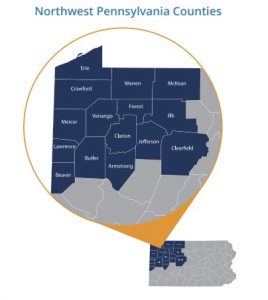View All Available Training Classes
 The Northwest Pennsylvania (NW PA) Veteran Suicide Prevention Program operates on a three-pronged approach involving healthcare providers, community organizations, and Veterans and their families. Because of this focus, we’re providing information about our newly expanded menu of training classes. We encourage you to learn about these training opportunities and share with your personal and professional networks throughout the region. While our primary focus is the 15 countries of NW PA, we may be able to accommodate those outside the region on a space-available basis. Please contact us with any questions or to schedule a training session for your business, community organization, or professional association. A printable pdf of the training course list is available to download and share.
The Northwest Pennsylvania (NW PA) Veteran Suicide Prevention Program operates on a three-pronged approach involving healthcare providers, community organizations, and Veterans and their families. Because of this focus, we’re providing information about our newly expanded menu of training classes. We encourage you to learn about these training opportunities and share with your personal and professional networks throughout the region. While our primary focus is the 15 countries of NW PA, we may be able to accommodate those outside the region on a space-available basis. Please contact us with any questions or to schedule a training session for your business, community organization, or professional association. A printable pdf of the training course list is available to download and share.
